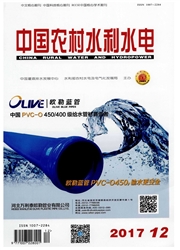

 中文摘要:
中文摘要:
船行灌区现行的渠系工作制度不合理,导致干渠流量不稳定和渠系水利用系数较低的问题。以西干渠输水系统为例,考虑不同时刻上级渠道配水流量波动最小和渠系渗漏损失最小这2个目标,以灌水连续性、配水量、流量以及灌溉可供水量为约束条件,建立了渠系工作制度多目标优化模型,采用非线性多目标遗传算法进行优化求解。结果表明,渠系工作制度多目标遗传算法优化模型适用于解决灌区渠系工作制度优化的问题,实行优化后的渠系工作制度可有效减少渠系渗漏损失、运行时间和流量波动。
 英文摘要:
英文摘要:
Because of unreasonable channel work system in Chuanhang Irrigation District, the flow of the main channel is unstable and the efficiency of canaFsystem water use is low. West-Main-Channel is used as an example and two targets are considered: one is the minimum fluctuation flow of higher channel at different moments, the other is the least seepage from canal system, watering continu- ity, distribution water, flow and water as irrigation are as constraint conditions. Multi-objective Optimization Model of channel work system using nonlinear multi-obiective genetic algorithm is established to optimize goals. The results show that the multi-objective genetic algorithm optimization model of channel work system solves the optimization channel work system in irrigation districts well. Using optimized channel work system can decrease seepage from canal systems, running time and fluctuation flow effectively.
 同期刊论文项目
同期刊论文项目
 同项目期刊论文
同项目期刊论文
 期刊信息
期刊信息
